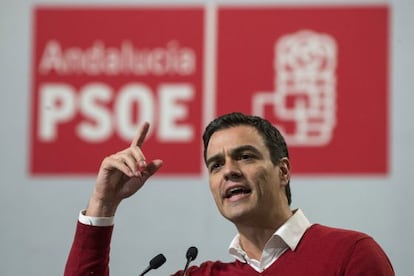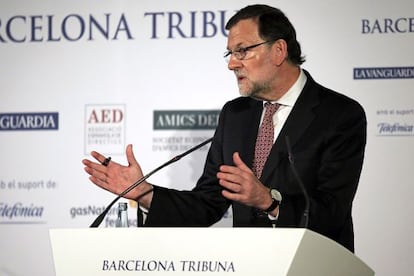Socialists and Podemos in fierce fight for votes in leftist strongholds
PP increases pressure on Ciudadanos to provide support to stop a left-wing alliance

On the last official day of campaigning before Sunday’s general election, candidates were still scrambling to win over thousands of undecided voters.
The ballot is being cast as a milestone in Spanish democratic history because for the first time, two new groups are seriously challenging the two-party hegemony enjoyed by the Popular Party (PP) and the Socialist Party (PSOE) since the early 1980s.
PP sources say the leftist alliance is a “perfectly possibly hypothesis that people should envision”
With most options still open in an uncommonly tight race, the effort to scratch a few more votes have been particularly apparent in the large southern region of Andalusia, a Socialist bastion that will deliver 61 seats in Congress.
This is where the PSOE is locked in battle with Podemos, the emerging left-wing party that could come in second or third on December 20, according to the last published polls.
At a campaign rally in Málaga on Thursday, Socialist nominee Pedro Sánchez accused Podemos of “dividing the progressive vote.”
But at a rally of his own in Seville, Podemos leader Pablo Iglesias took a different tack and instead of engaging Sánchez, chose to ignore him.

In an address that never once mentioned his Socialist rival, Iglesias presented himself as the only real alternative to Prime Minister Mariano Rajoy, of the conservative PP.
Despite their ongoing confrontation, PSOE and Podemos have worked together at the local and regional level following the May elections. In regions such as Castilla-La Mancha and Extremadura, Podemos supported the Socialists in order to oust the PP from office. In Madrid, cooperation between the Socialists and left-wing coalition Ahora Madrid, which included Podemos, took the mayor’s seat from the PP.
Rajoy confident of winning
Meanwhile, the conservative prime minister is confident that he will win re-election on the strength of the budding economic recovery, but knows that he will likely lose his absolute majority, making it necessary to seek out political partners.
Campaign aides said they were “moderately optimistic” about Sunday, when the PP could win around 29 percent of the vote, approximately five points more than the runner-up, which could be either the PSOE or Podemos, with Ciudadanos (C’s) coming in third or fourth.
The PP would ideally like to secure support from Ciudadanos over the next four years. But if party leader Albert Rivera persists in his intention to withhold support from either of the two “old” parties – the PP and PSOE – then “we are not ruling out debating pacts and coalitions with other options,” said PP campaign officials.
This might suggest the possibility of a grand coalition between the PP and PSOE, although this scenario seems highly unlikely. Asked about it at an event in Barcelona on Thursday, Rajoy responded evasively: “To be absolutely frank with you, I would rather discuss this matter after the 21st.”
But in an informal talk with journalists in Santander earlier this week, Rajoy reiterated his desire to reach “a governing agreement for the entire term” in order to offer the international markets an image of political stability at a time when the country is beginning to emerge from a protracted economic crisis.
“After the elections, I would like to see a government with a majority support in Congress, one that will present a program with the rules of the game for the next four years, and I would like to see everyone honoring their pledges,” he said again before a group of Catalan business leaders on Thursday.
Rajoy’s team is taking it for granted that for all their talk, PSOE and Podemos will if possible team up after Sunday, in an alliance that the conservatives refer to mockingly as “Psoemos.” Privately, some PP members also describe it as an alliance of “super-reds.”
The PP is trying to pressure Ciudadanos into supporting it, if only to prevent a “Psoemos” coalition from reaching power instead.
High-placed sources within the PP’s campaign drive denied that they were sending out a message of fear, and insisted that this leftist alliance was “a perfectly possibly hypothesis that people should envision.”
English version by Susana Urra.
Tu suscripción se está usando en otro dispositivo
¿Quieres añadir otro usuario a tu suscripción?
Si continúas leyendo en este dispositivo, no se podrá leer en el otro.
FlechaTu suscripción se está usando en otro dispositivo y solo puedes acceder a EL PAÍS desde un dispositivo a la vez.
Si quieres compartir tu cuenta, cambia tu suscripción a la modalidad Premium, así podrás añadir otro usuario. Cada uno accederá con su propia cuenta de email, lo que os permitirá personalizar vuestra experiencia en EL PAÍS.
¿Tienes una suscripción de empresa? Accede aquí para contratar más cuentas.
En el caso de no saber quién está usando tu cuenta, te recomendamos cambiar tu contraseña aquí.
Si decides continuar compartiendo tu cuenta, este mensaje se mostrará en tu dispositivo y en el de la otra persona que está usando tu cuenta de forma indefinida, afectando a tu experiencia de lectura. Puedes consultar aquí los términos y condiciones de la suscripción digital.








































